I have mixed feelings about Disco ending. I really dug the first season’s look at a Federation at war, and following the person who arguably set that war in motion dealing with her culpability. Add to that a ship that is part weird science lab, part haunted house. And yeah, I could live with the Klingon redesign.
It was inventive, it took risks and broke some moulds — and not always successfully, mind you. But I stuck with it from the hopeful “First three seasons are for growing pains” Trek paradigm.
Then the show took some odd turns. Rather than focusing on the crew’s adventures in space and science, season two constructed a cosmic conundrum around Burnham and her family. I was still on board for the characters, even bearded Spock no matter how shoehorned in he felt. The show’s unapologetic optimism was still a big selling point, too.
With season three came the time jump into a future that absolutely does not feel like it’s a thousand years ahead of the previous season. The jump in technology should be proportional to a Viking longboat rocking up to the ISS, but it felt like a step back. And at this point, the extended crew of the Discovery was thoroughly sidelined: Burnham’s personal relationships took priority over everything else.
For one example: As great as Michelle Yeoh is, the show basically redeemed a murderous space despot because… she reminded Burnham of her Starfleet counterpart?! I’m going to stop you right there, Captain “This is Starfleet” — this is a person who kept rubbing in Saru’s face how familiar she was with the taste of his species’ flesh.
I’ll keep watching Disco through to its end because I’m invested in the remaining characters, but this isn’t the show I apprehensively fell in love with anymore. Its strengths are all but gone, its faults enhanced, and its commercial(?) failure seems to have convinced the Powers That Be that future Star Trek needs to be grounded in nostalgia for previous eras.
I will miss the first season’s promise of new, daring Trek shows writ large, and as much as I liked Pike and his crew in season two, SNW leans too heavily and knowingly on the franchise’s campier canon for my taste (I know I’m in a minority with that opinion, and I’m not here to argue for or against). With peak TV fading, I’m afraid we won’t see anything as bold as TNG, DS9 — or early Discovery — again.

And at this point, the extended crew of the Discovery was thoroughly sidelined: Burnham’s personal relationships took priority over everything else.
This is the part that I’ve never got on well with in Discovery.
In TNG, it’s not a show about Picard, or Riker, or any of the other individuals. It’s a show about the crew. I’ve even seen it said that the actual star of the show is the ship.
Whereas, with Disco, it’s a show about Michael Burnham and everyone else has a bit part. That always felt weird for a Star Trek show. I want to see how the crew works together to solve problems and overcome things with everyone on an equal footing regardless of their rank in the show.
And I think that’s why there was such a warm reception to season 3 of Picard. It brought the crew back together. Picard alone isn’t satisfying enough. What we wanted was him as part of the crew.
Yeah, I agree in part with your points. Any Star trek show should be an ensemble effort, and that’s why, of the newer shows, Lower Decks is much more my bag.
FWIW, I thought the Burnham focus worked in season 1 as our POV into the war setting and previously unseen Trek periode. We got to know the crew through her as she worked her way back into Starfleet. But yeah, past that the “it’s all about Michael” approach became a detriment to the show. There was literally a whole crew to explore like they did, only somewhat, with Saru.
With Picard, I expected the new crew of La Sirena to crystallise around the main character and become a new constellation — but no. Season 2 turned into a strange Gothic exploration of Picard’s past, and one that actually contradicted what we know about the character. If Chabon hadn’t left the writer’s room, I think we would have seen a more compelling story.
I did enjoy parts of the final PIC season, but it felt like it was written by somebody who didn’t really get what TNG was about. The old crew felt two-dimensional, like clichés of themselves, showing up for a cameo and dropping a quip. But I’m already veering way off from the Disco focus of my post 🙂
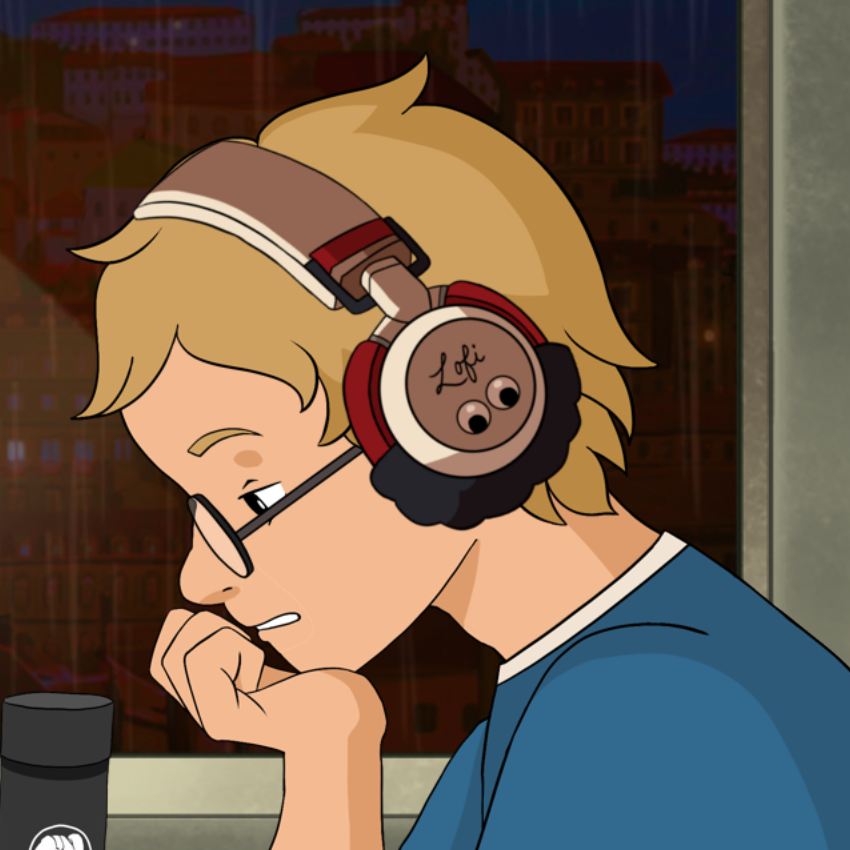
I love it when they try to take risks and do something new or different with the IP. Even if it fails, the end result is still usually more interesting than a safe retread would have been. Disco isn’t my favorite Star Trek, but it is one of the most interesting entries in the franchise, and has done a lot to expand and solidify the 23rd century canon.
People forget how controversial the Battlestar Galactica reboot was. Same goes for Daniel Craig’s James Bond. Simply being different from the source material is not enough to make it bad. Discovery isn’t as good as either of these, but i’m glad it tried.
This is exactly what got me into Discovery! The willingness to go beyond convention and subvert viewer expectation.
So often throughout season one they’d hit me with something that I’d never seen done in Star trek before, and I’d be in the edge of my seat until next week. The whole introduction of the USS Discovery — which wasn’t until the third episode — had so much of a weird science vibe, I was blown away. And then the body horror of the USS Glenn.
Spore drives! Feral tardigrades! Space whales! All that, and pitting Starfleet in a war against Klingons that were really, truly alien for the first time in decades. Oh man, that was a wild ride, until they moored it with the dutiful canon connections in season two…

I’ll disagree with a couple of points here.
the time jump into a future that absolutely does not feel like it’s a thousand years ahead of the previous season. The jump in technology should be proportional to a Viking longboat rocking up to the ISS, but it felt like a step back.
This presumes that technology always develops at the same pace (it doesn’t), and also ignores the two major cataclysms that the Federation endured, in the form of the Temporal Wars and the Burn. And even then, we see that the technologies we’re used to are faster and more efficient (the transporters are absolutely nuts), and we’ve seen new developments such as programmable matter. The pre-Burn Starfleet ships we’ve seen look like abstract art installations, and I think they absolutely look like they’re well beyond anything we saw 900ish years prior.
As for Burnham…while it’s indisputable that she’s the main character of the show, the entire principal cast gets plenty to do - much more than they tend to get credit for, which is a shame. They’re a great ensemble.
I agree about fluctuating rates of technological progress, but surely not at the scale of almost a millennium. I did expect some more creative choices from a production standpoint; like the thoughts and development that went into the (far closer) future technology of Minority report.
Yes, Disco’s personal transporter in the 32C was a pretty big deal, but only a logical progression from what had already been established throughout the series. “Programmable matter” was really just techno babble for hand held replicators, or 3D printers really — and detachable nacelles, how does that even work?
I will rewatch the show before the final season, and I look forward to another peek at the pre-Burn ships you mention. As I recall we barely saw them before they exploded but your description definitely makes me want to revisit those scenes!
On the balance between ensemble and lead focus — I think we’re more aligned here than it seems. I wanted more scenes from crew perspectives because what we got was so good in terms of acting and chemistry, and the cast were clearly up to carrying the show to a greater degree if they got the chance.
[Edit because apparently I can’t spell “development”]

“Programmable matter” was really just techno babble for hand held replicators, or 3D printers really
From what we’ve seen so far, I don’t think that’s quite true. For example, there’s no indication that programmable matter is edible. It also seems to be able to assume its forms with little-to-no power input, once it’s been programmed to do so. I hope we get to see its advantages and limitations more in the future (heh), but I really do think it’s a unique technology.
detachable nacelles, how does that even work?
Superconductors, according to “That Hope Is You, Part 2”.
I will rewatch the show before the final season, and I look forward to another peek at the pre-Burn ships you mention. As I recall we barely saw them before they exploded but your description definitely makes me want to revisit those scenes!
I should clarify, then, that I’m talking mainly about the ships we saw clustered around Federation Headquarters in season 3. Maintaining the cloaking field around HQ sadly kept them out of the action, but some of them are gorgeous. My personal faves (and I’m going to unabashedly pull from outside sources like STO to get the best possible images):
Eisenberg-class:
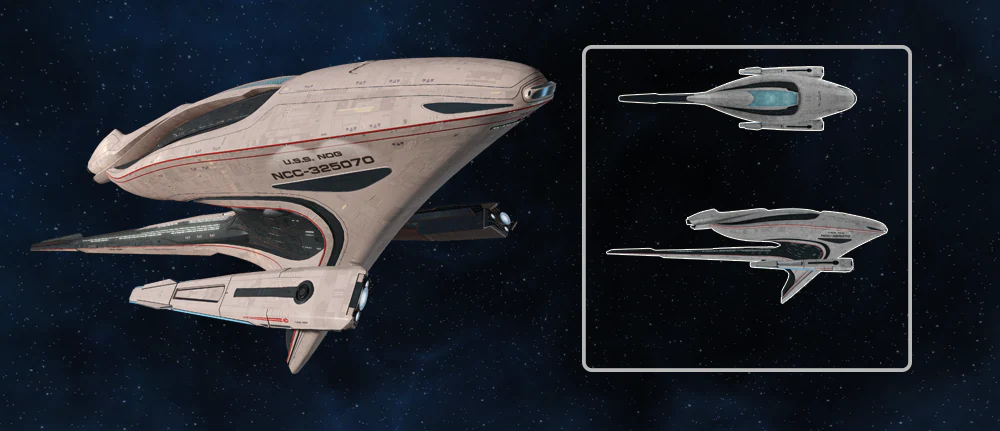
Courage-class:
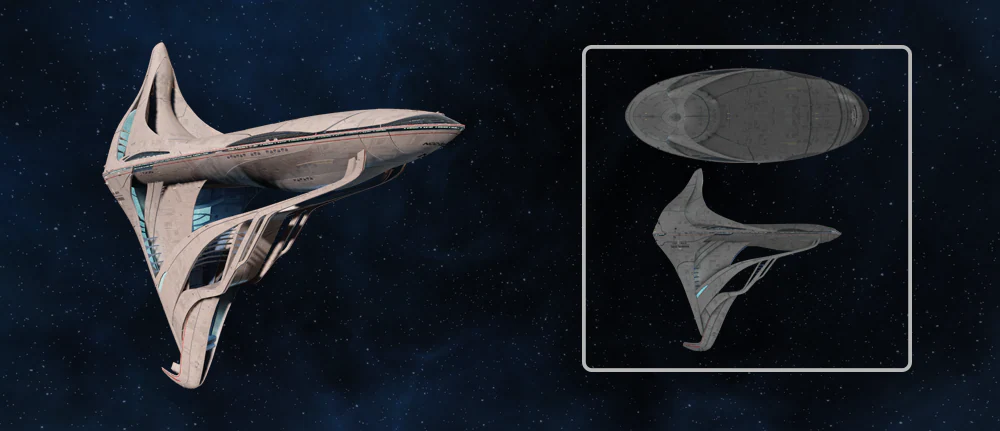
Saturn-class:
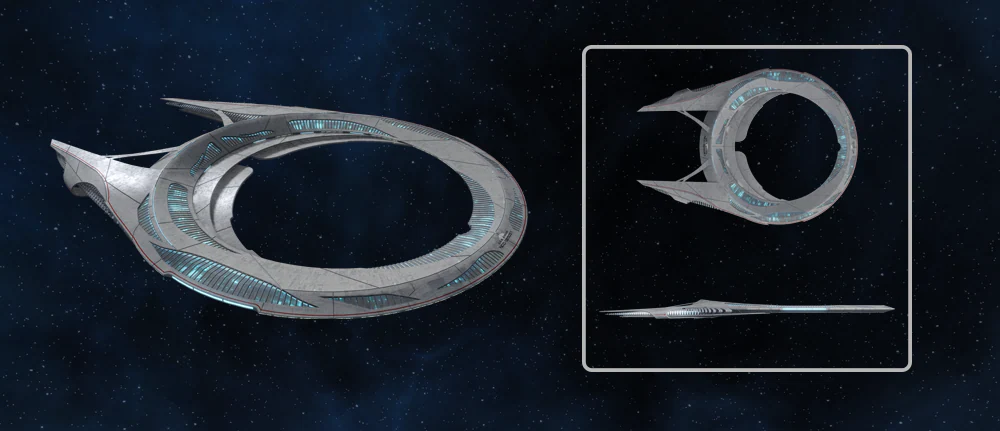
Angelou-class:
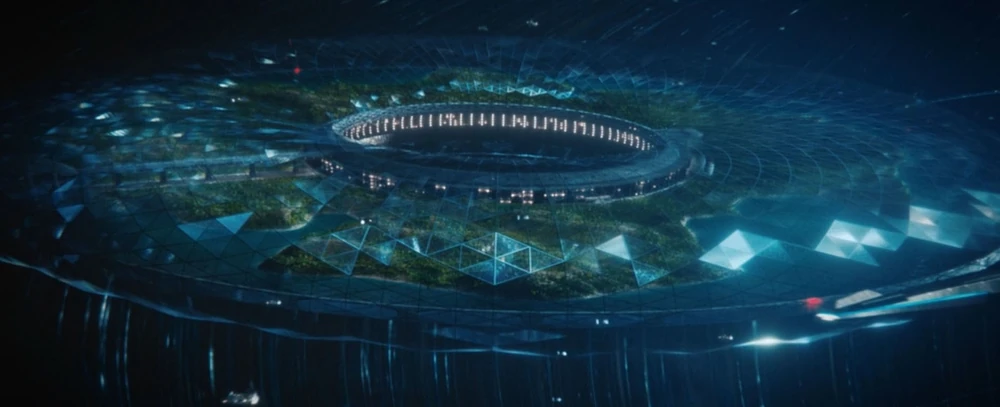
And of course, it turns out that Federation HQ itself is a fully-capable starship:
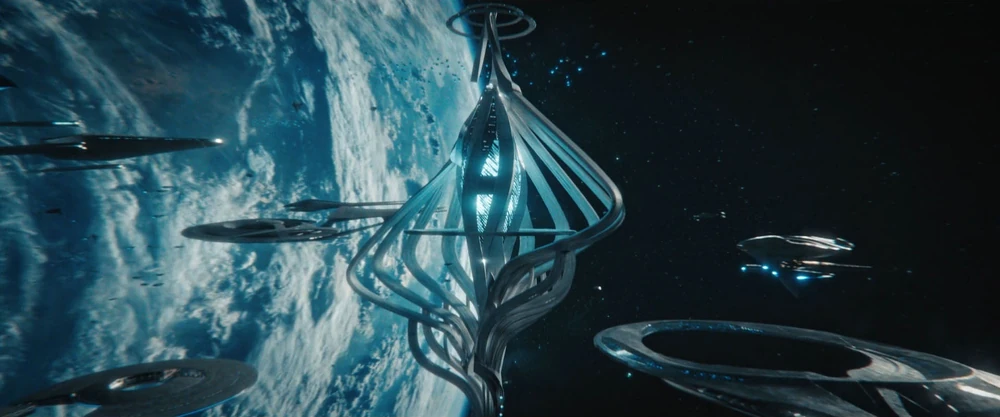

I saw a lot of hate for the Saturn class, and the arguments made sense assuming classic Starfleet designs and concepts.
I, however, love it because it begs the question: why? What is that for? And my mind jumps to all sorts of cool technobabble uses for such a weird ship design.
Some weird portal experiment? Evacuation ship made to maximize shuttle bay access? A specialized science ship designed with tons of inward-facing sensors? The mind boggles with possibilities.
The people who hated in it see wasted space. I see an unopened techno-mystery-box.

I don’t know if this makes me a radical, but I personally think that the truest sign of an advanced civilization is if they’re building these things because they can.
Art on equal footing with science, y’know?

That’s fair, and I think Starfleet HQ fits that bill. But I think (at least in my opinion of architecture as an art form, which I think starship design falls under, since people live and work there), I’d be frustrated to work on a Saturn class if that big hole did nothing, and made navigating between any two places on the ship more of a pain. That said, with personal transporters, maybe it’s not an issue (assuming this ship isn’t near any action that could make personal transporters inoperable). Maybe it would work well as a sort of diplomatic vessel, where having all these rooms with windows facing into the ring (like a giant round table) could be artistically conducive to discussion. Maybe they have a bunch of huge holo emitters in the ring, and they use it to project the current speaker, or just cool holo-art when not in session.

Yeah, and those sorts of whimsical designs could even point to exactly where the Federation was before the Temporal Wars and Burn happened and put them into survival mode.

All the more sad.
I honestly would love to see a “Utopia-Realized Level Federation” series, even a limited run, where all the plots are philosophical, artistic, interpersonal, or scientific.

Dang put this comment on Memory Alpha
Oh those ships! Yeah, I think that episode skimped on the ship porn, I could have sat through another couple of minutes of that scene 🙂
Tbf, when you wrote “abstract art” my hopes were for a ship that looks like a 3D Jackson Pollock, but I can rationally see how, even in Star trek, that wouldn’t be feasible for space travel…

Discovery also seems to employ the dimensional technology that the pod from the future employed on Enterprise, being much bigger on the inside

That’s not new. Turbolifts on the Discovery were depicted that way pre-refit, back in the TOS-ish era. It’s a (mind-boggling) stylistic choice or something.

Yeah but the season 3 finale took it to a new extreme

I’m not a huge fan of Discovery but I do hope we can get a balance between bold and new and the sort of nostalgia bait we’re in now. I mean, I love SNW, and it’s really filling out some canon gaps (love Uhura getting some real attention) but I really want to get away from cameos. They felt cheap in Disco S2 and they’re still cheap in SNW, but the writing is so much better it’s forgivable. PIC and LD are also very rooted in referencing old Trek. Hell, even Prodigy couldn’t resist making Janeway a (sort of) main character.
This is why I’m low key hyped about the Academy show, and am hoping it’s with Tilly in the far future. Give us Disco’s great, inclusive cast as peripheral characters, maybe even flesh them out more, but shift the focus to a class of cadets working as a team. Get back to that optimism and away from Burnham and whatever’s destroying the universe this season, without needing to root the show in old Trek.
I genuinely think Trek needs to get over its Kirk/Spock fetish. Beside SNW, there are still talks about another Kelvin film. If I’m honest, when that stalled over negotiations with Chris Pine, I hoped they’d just go on and make a one-off film where Sulu, McCoy and Uhura get to save the day on their own. Even then, why stick with that period?
I’m cautiously optimistic about the Starfleet academy show if it materialises. It could fall into either “The OC in space” or some kind of Top gun, West Point show bound to reenact “The first duty”. Tawny New some seems to be on board as a writer, so I’m hopeful.
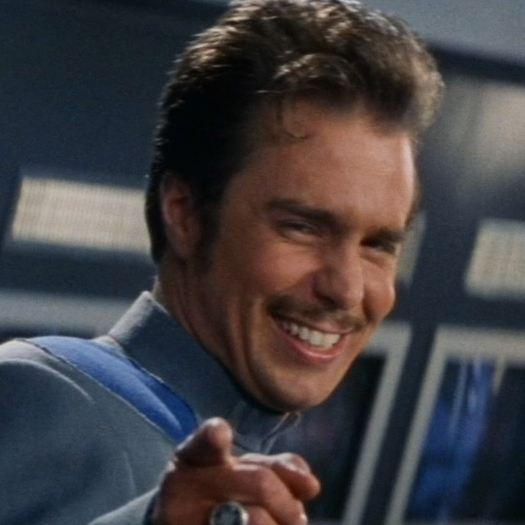
Yes, exactly. Season 1 knew what it wanted to be. When it was over, I remember thinking “alright, not bad, I’m excited to watch this show grow the beard.”
But it never did. In retrospect, Season 1 is the strongest season the show had to offer. Each subsequent season got a little worse as plots got more confusing, themes got more muddled, and no breakout characters emerged to carry the show through an abundance of narrative turmoil and worldbuilding strangeness. But above all else, seasons 3 and 4 are just boring. I don’t care about the crew or their mission. The most interesting characters are consistently the outsiders: Pike, Vance, Rillak. I’ll be watching season 5, but mostly out of a sense of obligation and morbid curiosity.
As much as I like SNW, it’s still not quite the show I’ve been waiting since 2005 for: seven curious officers on a ship called Enterprise set in the mid-25th century. I worry that SNW has robbed us of the opportunity to see the classic formula set in the immediate post-TNG era… even though that seems to be what season three of Picard was explicitly setting up.

Man, I was so not into seasons one-three. I watched each one hoping it would just calm tf down and tell one story well instead of bouncing all over the place. But then season four came along and it was one of my favorite Trek seasons ever of any series. And what do people say about it? That it was too slow. I can’t win! Looking forward to five tho.

My problem with season 4 wasn’t that it was slow, but that it was uninspired and by-the-numbers. I had worked out that the DMA was a “stepping on an anthill” situation by… episode 4, maybe? 5 at the latest. So then I got to watch one of the oldest tropes in sci-fi unfold for 8 more episodes, played completely straight. Yawn.
I’d rather watch the B-plot from S01E06 of Babylon 5 to experience that particular story again. That way I’d be done in an hour.
I think we have one obvious reason why season 1 was so solid: Bryan Fuller. He came to Trek with fresh ideas and thoughts about how to use them creatively in that setting. And he envisioned Disco as an anthology show that would focus on different eras each season, so the Burnham arc was one season, on to the next.
A lot clearly changed even before the show went into production, at which point he was out and Paramount probably reneged on doing new casting and design work for each new season. We’ll probably never know what could have been, and perhaps an anthology show would have the same dip in interest as it moved on.
For what it’s worth, the jump between seasons 2 and 3 did make that kind of radical change in setting that an anthology sets out to — but preserved the characters who had just fulfilled their mission to hide the sphere data, so there’s a contradiction in terms. And more to the point, the writers didn’t seem to know what to do with the characters once they made it to the future.
The evolution of Zora was an inspired idea (and literally cripped from Michael Chabon’s Calypso) but only became a detached plot strand, and Detmer’s PTSD was a gut punch only dealt with too superficially. So you’re right, despite some character highlights season three was meandering and listless. The crew had a whole future to explore, but no mission.
Rebuilding the Federation should have filled that hole with direction (or at least directives) but there wasn’t a lot of purpose to the space UN once it was restored. Maybe that dead water feels so frustrating because we’re seeing its literal mirror image in the deterioration of diplomacy and parliaments on the news every day. When Disco gets political it doesn’t mess around, but here it couldn’t deliver a show of common purpose because it was barely coherent itself. But I digress.
[Edit: misleading preposition]
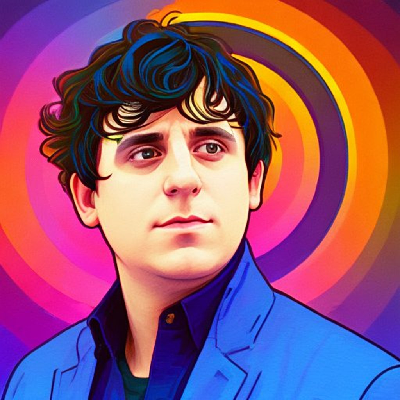
@halm @GuyFleegman I really wish I saw in S1 what you all seem too. To me it’s a weirdly disjointed season:
Part 1: Introduction two parter, set up Burnham.
Part 2: Klingon War
Part 3: Mirror Universe
Part 4: Oops, forgot the Klingons! Wrap up.I LOVED Lorca and his arc, that was very good. But the season itself doesn’t hang together as a consistent serialised story, it feels like they were halfway through shooting and had to suddenly make 4 more episodes, and it shattered the story.

Right, I said it’s “not bad,” hardly a ringing endorsement. It had some good ideas and concepts but it also has a lot of flaws, which is why it’s quite unfortunate that it’s the best Discovery ever managed.

as much as I liked Pike and his crew in season two, SNW leans too heavily and knowingly on the franchise’s campier canon for my taste (I know I’m in a minority with that opinion
There’s a reason for that
Oh, you read as far as you needed to find an easy angle for… whatever point you’re trying to make. Good for you. This is what I wrote immediately after:
I’m not here to argue for or against
I needed to type out my feelings about Discovery, not to be dragged into poorly manufactured conflicts. Feel free to pick a fight somewhere else unless you have something to say, and LLAP.

Yeah I read as far as I needed to, as in, I read all of it because the part I quoted was at the end. And for doing so, I should be praised and thanked, because it wasn’t a good read.

I’ve read through two threads recently on DIS, and I have found nobody talking about S4. Did everyone just give up at S3? Did we all forget about “growing the beard” and how long it can take a show to get it’s legs?
S4 is my favorite season of DIS. Species 10-C was some of the coolest new sci-fi for Star Trek in a while. The overarching plot was interesting in that it had high stakes, but it didn’t feel oppressive like other seasons. It still had a sense of hope and optimism. A lot of the characters got to expand their roles and relationships, feeling more like an ensemble.
I know there was some stuff that didn’t hit well in that season, but I can’t recall the details off hand (like I can for S1-S3). In my memory, the good outweighed the bad.
I am hopeful that S5 meets at least that mark, and hopefully glides into a graceful ending for the show. If I had my wish, S5 would make a switch to a more episodic style (rather than a big season-long central plot).

I think a lot of people enjoyed S4 quite a bit, and would agree with you in saying it’s best of the series so far (I personally prefer S3, but they’re both pretty solid IMO).
S5 should be an interesting project - based on what they’ve said so far, it’s still going to be a single arc, but with more of a scavenger hunt/adventure tone.

Oh, nice. I’m glad we aren’t ending with another stress-fest. End on a more fun note.

I mean, it sounds like the thing they’re hunting for is pretty dangerous (whatever it is), but it does sound like they’re going for a tonal shift.
You’re right, for my part I don’t have a distinct memory of season 4 — maybe because I haven’t rewatched it yet in preparation for s5 🙂 Season 3 felt lacklustre to me, the 32nd century was decidedly underwhelming, and my esteem for s4 may have been coloured by that Discovery fatigue.
As I recall, there was a lot of build-up before actually meeting the 10-c, and that I found the Arrival-style challenges of even communicating with them more interesting than whatever that guy from The expanse had going on? His character was as unconvincing as Jake Weber’s bored pirate in s3.
I’m looking forward to rewatching all of the first four seasons again to catch up before the last one, and hopefully on this wuewing s4 has as much kick as you describe 😉

I personally liked Ruon Tarka. He felt like a good foil for our protagonists. Sympathetic, believable, but still squarely in the wrong. I did not, however, believe Book siding with him for so long.
But I agree the coolest parts of S4 were at the end, trying to actually learn about the 10-C for first contact.

I also have mixed feelings about Discovery, but for different reasons. I love the characters and character writing. I disagree that the rest of the crew doesn’t get any development - but a lot of that does come in later seasons. My complaints are about the plots. I think season 1 was the most problematic in that respect with progressive improvements over the next two seasons. (I haven’t seen season 4 yet.)
- Overly ambitious arcs, and over-the-top stakes make the story feel unbelievable
- Discovery being the only crew able to address several civilization-threatening crises makes the universe feel small
- Leaning on action and artificial tension (like, the ship will explode in 3 minutes) is a cheap way to seek engagement that deprives us of time seeing the characters drive the story
overly-ambitious arcs in season 1
It wasn’t enough to try to take on the entire Klingon war at the same time as introducing a whole new cast. They also had to add an entirely separate, even more threatening crisis?
Making Michael responsible for both starting and ending the war makes you feel like the universe begins and ends on one ship.
We don’t need constant threats of annihilation in the story to be engaged! The most compelling Trek writing has had much lower stakes. When we have had high stakes, like in The Best of Both Worlds and The Dominion War, the writers managed to make us feel like we were seeing a pivotal part of a much larger conflict. They took the time to build up to the big tension, and took the time to play out satisfying resolutions. And they didn’t make it the entire show.
But things got gradually better,
over-the-top stakes in season 2
In season 2 they managed to limit themselves to a single major crisis. And they stepped it down from end-of-every-universe to end-of-all-life-in-one-galaxy. But still unbelievably over-the-top. Still too much artificial tension. Still too Discovery- & Michael-centric.
I love Michael, and I enjoy watching her be great at everything. But she can be part of a larger society of amazing people, and still be amazing herself.
somewhat lower stakes in season 3
And then they stepped it down again to maybe-end-of-what’s-left-of-the-Federation.
In season 3 things slowed down enough, and they spent enough time letting more of the cast develop and drive the story that I felt like I could enjoy the story without gritting my teeth.
season 3 world-building
But I do have similar feelings: the world-building of what is essentially a whole new galaxy in season 3 feels underdeveloped. I was initially frustrated by what felt like an attempt to distance Discover from Star Trek. Trek is supposed to be about a future utopia - we have enough other works that wallow in dystopia. But it seems like maybe it’s only supposed to be dystopian for one season? The ambitious writing is certainly still there.
I don’t disagree with you about mirror-Georgiou’s participation being unbelievable. The thing where everybody loves Michael to the degree where it becomes their primary motivation is too Mary Sue-like. Again I think that’s at its worst in season 1. OTOH having Michelle Yeoh on the show is a lot of fun so I’m inclined to forgive the stretch in that character arc.
That is pretty much exactly my feelings about the show, only I felt the high stakes in season 1 were warranted given we were seeing the Federation at war, which in itself is a nightmare for an essentially peacekeeping operation. Bringing in the Terran empire as a reflection on Starfleet’s warlike posture in that situation was inspired, I think.
I have to say again, this being the first new Trek on TV since Enterprise, I gave that season a lot of leeway in terms of story and stakes.
As for character development, you’re right — we did get to see small character arcs for Tilly, Saru, and Detmer. They were kind of drip-fed to us though, unlike the more ham-fisted Burnham bits like season 2’s “let’s telegraph her broken relationship with Spock by having her dead mother plant signals across the galaxy”. There were a lot of nice character bits in there, but it was mostly plot acrobatics to centre everything on Burnham, again.
I loved Tilly and her friendship with Michael, but I’m split over the journey Tilly did get. One of the first things she said was “I’m going to be captain one day,” but as it became clear that Michael was headed for that seat, Tilly got an abrupt arc of self discovery that made her decide to be a teacher instead.
Is it cool to realise that your goals are maybe fulfillments of somebody else’s dreams, and finding your own way? Yes, I love it! Did it smell a bit like the writer’s room backpedaling to make Michael even more awesome? Yes. Yes it did.

I definitely agree with you. While I didn’t like a lot of the elements of Disco season 1, it had a genuineness that was really compelling. Season 2 corrected the things I personally didn’t like but kept the heart and soul which has made it some of the finest modern Trek in my opinion. Season 3 was alright I suppose, but didn’t have that spark of authenticity. I’m dubious about anything more from Disco.
The big issue for me is also the show centering on Burnham. Season 2 put her along side Anson Mount’s Pike which balanced the scale nicely and their personalities played well together, but other than that Burnham has always felt like the main character of a CW show to me. I don’t know if it’s the writing for her character or the acting, but she’s a weak point of the show to me. Doug Jones on the other hand has been incredible and I could watch him play Saru all day 😄
For what it’s worth, I’ll maintain that Burnham’s character was great in driving action forward (ie. throwing herself blindly into conflicts), and I think Sonequa Martin-Green has been a terrific actor and ambassador for Trek and Disco. If the show instead had put that much focus on Saru or, heck, Bryce over the course of four (soon five) seasons, that would have been a bit much, too.

That’s very true, and as an actor Sonequa does really give the role everything she has. I think that touches on one of the other commenter’s points a bit: Trek seems to thrive when they balance the story load between characters. When a lot of plot weight is put on to one character it starts to feel like they are simply a plot device. I’ve heard complaints about Kirk in TOS suffering from this as well, but perhaps nostalgia keeps me from being too offended 😄.
Your comment made me realize something that is a the root of why I never connected with the Michael Burnham character or Sonequa’s acting, and its linked (from a writing perspective) to Ethan Peck’s Spock: they’re both portraying the clash of human and Vulcan culture, with a few key differences. Spock is a half-vulcan, half-human that was raised and shaped by Vulcan culture. Ethan portrays someone who is firmly rooted in logic, but struggles to control the human emotional elements within him. The key to his character growth is accepting and unifying the two halves of himself (although Trek as a series is not always clear about this. Sometimes it seems they indicate he does best when suppressing the human side, not integrating it.) Burnham is full human and raised through her formative years by human parents, but then goes through a massive childhood trauma and is adopted and given formal training on Vulcan. Sonequa portrays someone who tries to firmly root herself in logic, but who suffers greatly because that denies the experience of her inner self. The key to her character growth is rebelling against the expectations others (and she herself) had put on her in order to discover (pun intended 😏) who she actually is. Which of these two struggles we connect with depends on our own childhood and emotional make up, and the other may seem foreign and empty simply because we haven’t experienced it. Spock’s struggles always seemed more realistic and balanced to me with Burnham coming across like a teenage edgelord rebelling against her parents. I think now I’ll be looking at it very differently, and it makes me excited to see what Season 4 brings. I might do some rewatches of the early seasons too, if I can ever finish working my way through Voyager 😅. Thank you for your comment, sorry mine is so long, brevity is not my strong suite 😵💫
And one more thing I agree with from your original post: Star Trek as a franchise really struggles “To boldly go where no one has gone before” anymore. The studio clearly values success over quality and the reliance on nostalgia for current shows is very disappointing. There are glimmers here and there, maybe the section 31 movie will bring some fresh air to the writing table.
Oh, never apologise for explaining such a good point at length! Ever so often watching Discovery I’ve had to remind myself that Burnham is partially raised Vulcan, and that that background at odds with her humanity is part of motivating her actions. Sometimes the writers are subtle about it, sometimes not so much.
discover (pun intended 😏)
Ah, I see what they did there…! 🤣
As for innovation seeping back into the shows, my hopes are also for a Starfleet academy show because it’s such a shift in setting and age group from what we’ve seen before. On the other hand, with Paramount dropping Prodigy and closing Disco to focus on SNW, they’re really circling the wagons around the well-known formulae and characters.
I sort of feel like Disco was our shot at reinventing Trek for the 21st century, and they dropped the ball early on.

